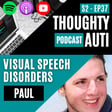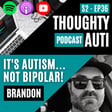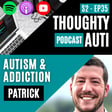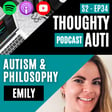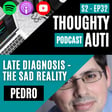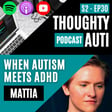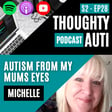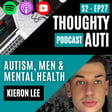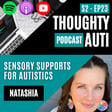
Autism, ADHD or AuDHD? (Coaching with Brooke)
How do you know if you're Autistic or have ADHD? What are the differences between Autism and ADHD? What similarities do Autism and ADHD have?
Brooke Schnittman (@Coachingwithbrooke) is an entrepreneur and ADHD coach with a team of 8 ADHD coaches; with over 120k Instagram followers, Brooke produces a lot of content raising awareness of ADHD traits and how to work with those traits practically in your own life.
Brooke's Links - https://linktr.ee/coachingwithbrooke // My Links - https://linktr.ee/thomashenleyUK
Dbud Noise Cancelling Adjustable Ear Buds (15% Off) - https://dbud.io/thomashenley
Thomas Henley kicks off the episode by talking to Brooke about language differences between the USA and the UK, the different spheres of the Autism world, her background in managing the top-rated special education public school in the entire USA, and her experience creating the SuccessFULL With ADHD podcast.
One of the most difficult things with neurodivergencies like Autism and ADHD, is separating them from each other for the purposes of identity, support, teaching methods, and possibly the use of medication. In line with the topic, Brooke and Thomas highlight some common similarities between Autism and ADHD from a diagnostic standpoint: Intense fixations and interests, emotional dysregulation, executive functioning issues, stimming behaviours, sensory differences, problems with socialising, burnout, processing differences and a need for routine.
They speak on the interesting dynamics that occur between Autistic and ADHDers in social relationships and communication, whereby Autistic people are usually led into interesting off-shooting topics by the ADHDer, but the ADHDer finds a lot of use in the directness and blunt communication from the Autistic person in focussing on the topic of conversation or achieving mutual clarity.
Teasing apart differences between Autism and ADHD proved to be very difficult due to the large variance in traits of individuals within each group... but talk around hyper vs hypo awareness of indirect communication, Alexithymia, hyperactivity, impulsivity, transition or focus behaviours, verbal vs internal processing and flat affect came up as some solid ways to differentiate between the two.
Due to the present-day stigmas and stereotypes of Autism compared to ADHD, most find themselves diagnosed with ADHD before Autism. For the purposes of practical application, the two propose different traits that an Autistic or ADHDer can look for to know if they should pursue the other diagnosis:
Autistic people looking into ADHD could look for signs of daydreaming, racing thoughts, switching from task to task quickly, getting sidetracked easily and consistently, oversharing, or restless energy.
ADHDers looking into Autism could look for more issues with Autistic inertia, big issues with transitioning, issues with alexithymia, starting conversations, noticing indirect emotional cues, shutdowns/meltdowns, faux regulation and flat affect.
They end on speaking about the USA to the UK, and Autism to ADHD language differences. Thomas speaks on the Autistic community's aversion to the term Aspe






